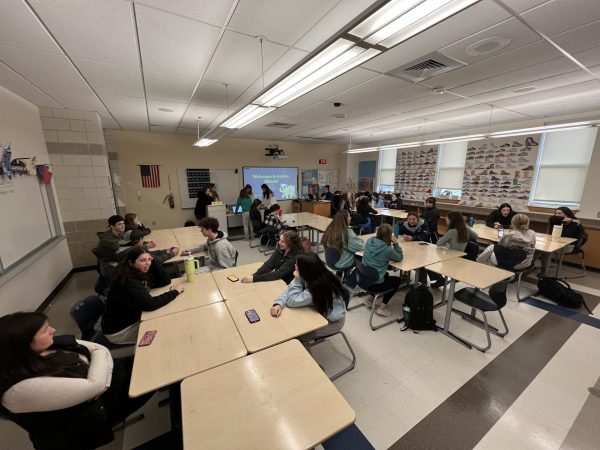Stressing For the Future During Junior Year
October 30, 2015
Juniors at Franklin High School (FHS), in their second month of this important year, are feeling the effects of stress already.

Going into Junior year, many students have heard how awful and stressful this year is and that it is the highlight of colleges’ focus; making it crucial for the future to do well. With all the pressures that come from being a Junior in high school, many students feel overwhelmed by having to deal with an increase of schoolwork and creating a backbone to their future plans.
As a New York University study had stated about much of the youth population: “High levels of chronic stress … impedes [the youths’] abilities to succeed academically, compromises their mental health functioning, and fosters risk behavior.” 1
The expectations of doing well with the SAT and ACT tests, looking at colleges, figuring out future plans, and upholding the workload within class is taxing on all the students, not to mention social pressures and struggles at home that students have to worry about as well.
Jess Simms, an FHS Junior, completely agrees with what she has heard about Junior year and states: “We’re still very young and it doesn’t make sense that this should be the most important year for our future; we’re sixteen and we shouldn’t be this stressed.”
Once starting Junior year, students have been hit with all the expectations that this year will bring and Simms states that people have been expecting too much from her in the first few months of Junior year and she tries the best she can. Doing well, for her, is quite important: “Because if I didn’t care [about school] then I’d wind up going to Dean College,” says Simms.
She states that school is her top priority, but not to the extent of having to drop most of her extracurriculars to keep up. She worries that dropping too much would mean that school is taking over and she believes it should not be like that. All the late nights and adjusting her dance schedule to fit the school’s makes the extra work in this year harder to deal with.

To manage the amount of homework she gets, Simms ignores the urge to become overwhelmed and powers through until everything is done. She keeps her mind busy with thoughts of the weekend, being able to sleep, and the feeling of relief to help her stay calm.
Another Franklin Junior, Morgan Soderlund, conquers her stress by another strategy. Instead of forcing herself to do all of the work at one time, leaving it sloppy and useless, she takes a short break to listen to music and to let her mind relax before returning to her work.
Along with four different after-school clubs, orchestra, and working at her job, Soderlund still dedicates most of her efforts to school and doing well for the future. She affirms that slacking during high school will hurt in future careers, but also taking too much time out of life to focus on school work will hurt too, stresswise.
Soderlund emphasizes: “It’s the fact that it’s only a month and a half in and I’m already this stressed.”
Most of her dedication to school comes from being motivated to get into college and from expectations put on her by her family. She pushes herself to accomplish more out of school, but with her nerves distracting her: “I want to do well, but there is also pressure to do well by others” she says.
Looking back on Sophomore year, many Juniors do not miss the year itself but do miss less homework and less expectations. Soderlund states she is: “At least five times more [stressed]” now than Sophomore year and is only looking forward to Prom, then the end of the year.
















